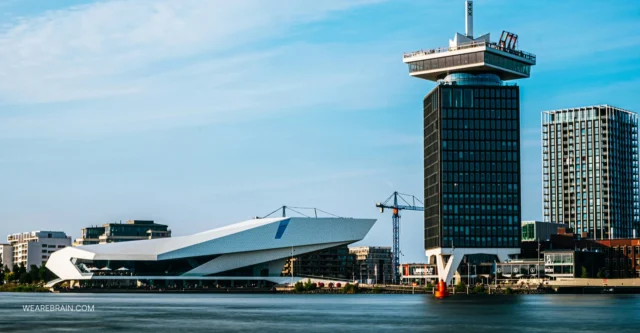
Amsterdam, once the epicentre of global trade in the 17th century, is experiencing a new golden age this time as one of Europe’s most vibrant startup ecosystems. For entrepreneurs considering where to launch a startup in Amsterdam or the wider Netherlands, understanding the landscape is a key step.
The Netherlands has transformed itself into a fertile ground for innovation and entrepreneurship, combining Dutch pragmatism with forward-thinking policies to create an environment where startups can thrive.
Whether you’re an aspiring entrepreneur exploring the startup scene in the Netherlands, an investor seeking the next unicorn, or simply curious about what makes this small country such a mighty force in the startup world, here are 10 key statistics about startups in the Dutch capital.
1. Funding landscape
The Netherlands isn’t just keeping pace with European funding trends – it’s setting them. Dutch startups raised an impressive €2.5 billion in 2024, marking a 19% increase from the €2.1 billion raised in 2023 and making 2024 the third-best funding year ever for Dutch startups.
This robust growth has positioned the Netherlands as Europe’s fourth-best-funded startup ecosystem in 2024, surpassing Sweden and Switzerland. Only the UK (€17 billion), Germany (€7.9 billion), and France (€7.7 billion) attracted more investment.
Amsterdam continues to be the gravitational centre of this funding universe, with startups in the capital city alone raising €576 million in Q4 2023 – a testament to investors’ confidence in the ecosystem.
What this means for entrepreneurs: The increasing availability of capital creates more opportunities for startups at various stages. For early-stage founders, this signals a healthy ecosystem where good ideas can find backing. However, it also means that competition for funding is fierce. Having a solid business model, clear market fit, and compelling value proposition is more important than ever.
2. Startup density
Size isn’t everything in the startup world – density and quality often matter more than quantity. Amsterdam exemplifies this principle, hosting approximately 4,000 startups that employ 196,000 people, making it one of Europe’s densest startup hubs.
Perhaps even more impressive is the value creation within this compact ecosystem. With a population of around one million, Amsterdam startups were worth a staggering €227 billion as of June 2022, ranking second in Europe after London – despite having roughly a tenth of London’s population.
What this means for entrepreneurs: This density creates a powerful network effect. Founders benefit from close proximity to other innovators, investors, and talent, facilitating faster knowledge sharing and collaboration. The high concentration of startups also means better access to mentors who’ve navigated similar challenges and opportunities to connect with potential partners or customers within a relatively small geographic area.
3. Sector strengths
While Amsterdam’s startup ecosystem shows impressive diversity, certain sectors have emerged as particular strengths. Fintech remains dominant, attracting €189 million in funding in the first half of 2022 alone.
Health tech and clean-tech are gaining momentum rapidly, as evidenced by VectorY Therapeutics raising €129 million in Q4 2023 for life sciences innovation.
The future looks particularly bright for advanced technologies, with deep tech ventures now comprising 12% of the Dutch startup landscape – over 1,342 companies focusing on AI and quantum computing.
What this means for entrepreneurs: Understanding these sector strengths helps founders position their startups strategically. For those working in established strongholds like fintech, it means access to specialised talent and investors familiar with the space. For entrepreneurs in emerging sectors, the Dutch ecosystem offers the infrastructure and growing expertise to support innovation while potentially facing less competition than in more saturated markets.
4. Success rate and survival statistics
Perhaps one of the most encouraging statistics for founders considering the Netherlands is the improving rate at which startups successfully scale. The scaleup ratio in the Netherlands rose dramatically from 13% to 21.5% over five years (2019–2024), indicating improved survival rates and growth potential.
This significant increase suggests that not only are more startups being founded in the Netherlands, but a higher percentage of them are successfully navigating the treacherous early years to become established, growing businesses.
What this means for entrepreneurs: The increasing scaleup ratio reflects a maturing ecosystem that’s becoming more effective at supporting startups through their growth journey. For founders, this means better odds of success compared to many other ecosystems, likely due to the combination of available capital, supportive policies, and the accumulating wisdom within the Dutch startup community.
5. Talent pool and workforce
Access to qualified talent is often cited as a top challenge for growing startups, but the Netherlands offers a significant advantage in this area. The country boasts one of Europe’s most skilled workforces, with 90% of the population fluent in English – making it easier to build international teams.
While Dutch tech salaries are competitive globally, they remain reasonable for employers. Software engineers earn between €66,782 and €114,904 annually, allowing startups to attract international talent without the extreme costs seen in Silicon Valley or London.
What this means for entrepreneurs: The combination of a highly educated workforce, widespread English fluency, and relatively manageable salary expectations creates an ideal environment for building diverse, skilled teams. Founders can recruit locally while also attracting international talent, giving Dutch startups a competitive edge in building world-class products and services.
6. Government support and incentives
The Dutch government has consistently demonstrated its commitment to fostering a startup-friendly environment through practical policies and financial support. The Innovatiekrediet (Innovation Credit Scheme) is one standout example, supporting startups developing marketable innovations within five years.
Additionally, the startup visa program has successfully attracted international entrepreneurs to Amsterdam’s ecosystem, allowing talented founders from outside the EU to establish and grow their businesses in the Netherlands.
What this means for entrepreneurs: Government support reduces some of the inherent risks of startup entrepreneurship. Access to grants, favourable tax treatments, and visa programs makes the Netherlands particularly attractive for both Dutch and international founders. However, navigating these opportunities requires some knowledge of the system and often benefits from local partnerships or advisors who understand how to access available resources.
7. Scale-up transition statistics
The ultimate goal for many startups is to successfully scale, and the Netherlands is showing impressive momentum in this area. The number of scale-ups grew by 12% to reach 268 companies in the Netherlands by early 2025.
This growth isn’t just about quantity—it’s also about creating companies with global impact. In 2024 alone, two new unicorns emerged: Mews and DataSnipper, highlighting successful transitions from startups to scaleups.
What this means for entrepreneurs: The increasing number of successful scaleups creates valuable role models and potential mentors for earlier-stage companies. It also demonstrates that the Dutch ecosystem can support the entire entrepreneurial journey from initial idea to global impact. For founders, these examples provide both inspiration and practical blueprints for scaling their own ventures.
8. International expansion
The Netherlands’ strategic position in Europe and its long history as a trading nation make it an ideal base for startups with global ambitions. The country’s well-established trade routes extend far beyond the EU, providing quick and efficient access to major markets in Asia, North America, and beyond.
Dutch startups are increasingly visible on the global stage, actively participating in international tech events like 4YFN in Barcelona and CES in Las Vegas. This indicates a strong interest in international expansion and connecting with global customers, investors, and partners.
The Netherlands Enterprise Agency (RVO) provides substantial support for startups with international ambitions, including market intelligence and access to the Start-up Officers Network for finding entry points and cooperation opportunities abroad.
What this means for entrepreneurs: Founders who establish their startups in the Netherlands gain a strategically positioned European base with a globally oriented business culture. The combination of government support for international expansion, established trade connections, and a highly international local ecosystem creates an ideal environment for startups with global aspirations from day one.
9. Corporate-startup collaboration
The Netherlands has fostered a particularly collaborative environment between established corporations and emerging startups. As of 2024, deep tech startups specialising in AI, quantum computing, and semiconductors now make up 35% of the Dutch tech ecosystem, indicating a growing focus on corporate-startup collaborations in advanced technologies.
This collaborative spirit is further exemplified by Amsterdam’s Science Park being officially selected by the EU as the site for a new quantum computer, highlighting the potential for partnerships between startups and larger institutions in cutting-edge fields.
What this means for entrepreneurs: For startups, these collaborations can provide access to resources, established customer bases, and industry expertise that would be difficult to build independently. Corporate partners, in turn, gain access to innovation and agility. Founders who understand how to navigate these partnerships – maintaining their innovative edge while leveraging corporate resources – can accelerate their growth significantly.
10. Sustainability focus
The Netherlands has emerged as a leader in sustainable innovation, with many Dutch startups focused on addressing environmental challenges. Cleantech startups have raised significant funding in recent years, with SkyNRG securing $190 million for sustainable aviation fuel production as just one example.
Amsterdam-based Fairphone continues to lead sustainability efforts in tech by producing ethically sourced smartphones, demonstrating that Dutch startups are not just focused on commercial success but are pioneering new approaches to responsible business.
What this means for entrepreneurs: The emphasis on sustainability creates opportunities for startups developing solutions to environmental and social challenges. It also reflects a business culture that increasingly values purpose alongside profit – a trend that resonates with consumers, employees, and investors alike. Entrepreneurs who can align business objectives with sustainability goals will find a receptive ecosystem in the Netherlands.
The Dutch advantage for startups
These ten statistics paint a picture of a thriving ecosystem where economic opportunity meets quality of life, a rare balance in the startup world. For entrepreneurs looking to launch a startup in Amsterdam, the ecosystem offers a combination of robust funding, government support, international orientation, and a commitment to sustainable innovation.
The startup scene in the Netherlands stands at a unique intersection: large enough to provide resources yet small enough to navigate effectively; competitive enough to drive excellence yet collaborative enough to foster mutual success. This dynamic environment continues to mature, transforming from a promising hub into fertile ground where innovative ventures can flourish.
Need support with in startup journey? Don’t hesitate to contact us.
